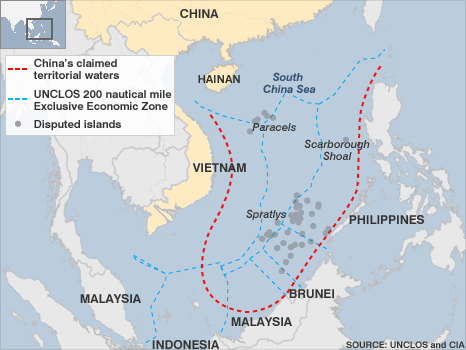Vietnam has reported that China on Thursday of intentionally rammed and damaged a Vietnamese research ship operating within Vietnamese waters, in a “premeditated” incident, according to Bloomberg. The attacked ship was a survey ship operated by Vietnam Oil & Gas Group, and the attackers were three ships: a fishing boat equipped with specialized cable cutting equipment, and two enforcement vessels. Vietnam has lodged a protest.
 China/Vietnam clash at sea in May (Vietnam News)
China/Vietnam clash at sea in May (Vietnam News)
The attack took place one day after China announced the deployment of an aircraft carrier, and four days after China’s Defense Minister assured Vietnam and other Chinese neighbors that China’s military buildup presents no threat to them.
This attack took place just two weeks after a similar Chinese attack on a Vietnamese ship.
On May 26, Chinese vessels attacked the Binh Minh 02, a PetroVietnam survey ship, and cut its cables, according to Vietnam News.
In the new attack, on Thursday, something went wrong, and the cable cutting device on the Chinese fishing vessel became entangled in the underwater cables of the Vietnamese ship, according to Reuters. Two Chinese ships then came to help the fishing vessel, and were able to free it.
The Vietnam Foreign Ministry has handed over a diplomatic note to representatives from the Chinese embassy in Hanoi in protest against China’s action, according to Vietnam News. The note demanded that China immediately cease and prevent the re-occurrence of activities that violate Viet Nam’s sovereign right to its exclusive economic zone and continental shelf. The note also demanded compensation for damage caused.
Increasing Chinese belligerence
The confrontation comes at a time of increasing Chinese belligerence in claiming vast portions of the East China Sea and the South China Sea. China is claiming that its territorial borders extend more than 1,000 miles from the Chinese mainland. They support this claim by a kind of recursive “island chaining” strategy — they claim one island, then claim all islands within 200 miles of it, then repeat the process with each of those. (See “28-Jun-10 News — Military tensions increase in South China Sea.”)
 South China Sea, with red line added to show region claimed by China as part of its sovereign territory (BBC)
South China Sea, with red line added to show region claimed by China as part of its sovereign territory (BBC)
The U.S. has also objected to China’s aggressive claims in the South China Sea, because China is consequentially claiming control of what are now open sea lanes, and is demanding that any foreign ships, particularly American ships, be forbidden from entering the claimed region without China’s permission.
CIA director Leon Panetta, who has been nominated to succeed Defense Secretary Robert Gates, said this week that China appears to be building the capability “to fight and win short-duration, high-intensity conflicts” along its borders, according to Bloomberg.
Panetta’s remarks came a day after a NY Times op-ed saying, “China is trying hard to make up for its diplomatic setbacks in 2010, when, in quick succession, it picked territorial fights with Vietnam, the Philippines, Japan and India, and angered South Korea by not condemning Pyongyang’s aggressions.”
China responded to both statements in an editorial in its state-sponsored organ Global Times. According to the editorial, Panetta has exaggerated Beijing’s military threat, and his motive was to exacerbate frictions between China and its neighbors.
The article quotes a Chinese analyst who says that Panetta’s comments could be seen as a provocation by the US to exaggerate tensions between China and its neighbors. He adds that although there were some frictions between China and its neighbors, the Chinese government has put a strong emphasis on improving regional relations this year.
The analyst concludes that the possibility of large-scale abiding tensions are small since China will never provoke conflicts and neighboring countries would not intensify frictions.
This is the way it always is with China. They continually preach harmony and getting along, but what they always mean by that is that everyone can get along fine, as long as China always gets its way, and nobody criticizes China.
When China says it will “never provoke conflicts,” it’s following the advice of Deng Xiaoping, Chinese leader in the 1980s, who said, “Observe calmly; secure our position; cope with affairs calmly; hide our capacities and bide our time; be good at maintaining a low profile; and never claim leadership.”
But the bottom line is that China will become increasingly belligerent and militaristic in supporting its claims to vast regions in the South China Sea and India, and other regions including Taiwan, and is preparing for war with the West to secure all of those claims.
China and Vietnam hack each other’s web sites
China’s attacks on Vietnam vessels have provoked large anti-Chinese protests in front of the Chinese embassy in Hanoi. The protests have now taken another step, as computer hackers from Vietnam and China have been attacking web sites run by each other’s governments. BBC
China accuses Vietnam of escalating sea tensions
Late on Thursday, China accused Vietnam of “gravely violating” its sovereignty and endangering the lives of Chinese sailors. A statement from China’s Foreign Ministry says, “It must be pointed out that by conducting unlawful oil and gas surveys in seas around the Wan-an Bank of the Spratly archipelago and by driving out a Chinese fishing vessel, Vietnam has gravely violated China’s sovereignty and maritime rights. China demands that Vietnam cease all violations.” Reuters
COMMENTS
Please let us know if you're having issues with commenting.